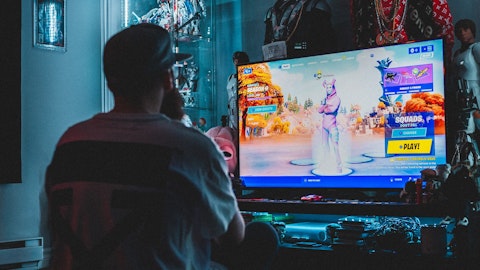I think we’ve learned a great deal from that. Second is, the game while it really engaged the core deeply, and it actually attracted a lot of new users, which we think speaks volumes for the future success potential of the franchise, it didn’t retain the more casual user at the rate that we needed it to, and in a game that relies a lot on team play and competitive play, liquidity of the overall player base is really, really important as you think about the future experience of players over time. And then third, I think the mobile market continues to be challenging, and we certainly saw €“ you know we launched into what was a soft mobile market, and with some changing and evolving kind of player personalities as we move through. So as we think about this on a go forward basis, we take those learnings and we apply the real strengths, which is we know Apex has incredible demand from both the core users and new more casual users.
We know that we have the underlying ingredients to make an incredible game. We need to be thoughtful about the nature of the core game mechanics and the retention mechanics that we build into the game over time, and most importantly, as we look at the mobile market, the biggest new launches that are seeing the most success are the ones that are deeply connected to the broader franchise, where there’s not always cross play, but it’s certainly cross progression and a feeling that they are part of a single unified community and a single unified game experience. And so as we think about that for the future, that will be very, very important as we reimagine Apex Mobile. And certainly as we had those learning from Apex Mobile and we were developing into Battlefield Mobile, we anticipated that while Battlefield had also been in development for some time and was making good progress, given the construct of that game, it also was probably going to run with some of the same challenges, and rather than continue to push against that, we wanted to come back, take a breath, reset and really think about the broader franchise strategy and allow the leadership to build a true cross platform immersive game experience around a reimagined battlefield in the future.
Both of these things represent strong learning opportunities for us, and both of these things represent an ability for us as a company to lean into two great franchises in a way that the mobile market is more aligned to for the future.
Andrew Uerkwitz: Got it. I really appreciate that color. Thank you, guys.
Operator: Your next question will come from the line of Eric Sheridan with Goldman Sachs. Please go ahead.
Eric Sheridan : Thanks so much. Maybe building on Andrew’s questions, so I want to come back first to mobile. You know how do you think about the array of type of content you have on the mobile side, and how much of it is potentially exposed to sort of casual play that might act in a more sort of hyper sort of volatile mode as consumer monetization might be volatile, depending on what happens with consumer spending going forward, versus maybe some of your sports titles and mobile that have a very different trajectory from a spend perspective. So I want to sort of broaden out the conversation to what you’re actually seeing on the spend side across an array of mobile that really runs the gamut first. And then second, I think we’ve seen a lot of folks in the industry talk about pushing titles out, out of €˜22 now and into ’23 and calendar ’23 and maybe even calendar ’24.





